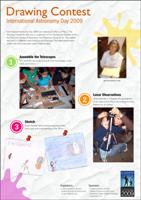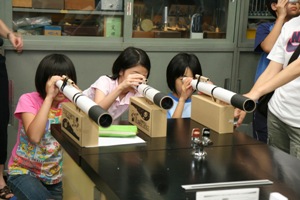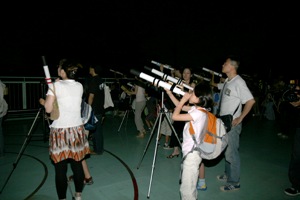This column introduces science and technology cooperation between African counties
and Japan which started taking advantage of the African Science and Technology
Research Mission. Hoping that cooperation with Africa in the field of science, which
called Rika or Kagaku in Japanese, develops with this mission as a start, we call
cooperation reported here the bud of “Afri-Kagaku”, putting Africa, Rika and Kagaku
together.
1. Cooperation for the Promotion of Science and Technology Education Using Telescopes
Prof. Kazuhiro Sekiguchi
Director for International Research Collaborations, Professor
National Institutes of Natural Sciences
National Astronomical Observatory of Japan (NAOJ)
Cooperation for the promotion of science and technology education using astronomical
telescopes has been under way in Egypt since the Japanese government dispatched the
African Science and Technology Research Mission to the country.
On the occasion of the mission’s visit to Egypt, the dispatch of which was conducted by
the Cabinet Office from February 18 to March 8, National Astronomical Observatory of
Japan(NAOJ) decided to implement science and technology education programs using
astronomical telescope assembly kits in cooperation with the Ministry of Higher
Education and State Ministry for Scientific Research, the National Research Institute of
Astronomy and Geophysics (NRIAG) and the Japan International Cooperation Agency.
The year 2009 is the “International Year of Astronomy 2009” to mark the 400th
anniversary of space observation by Galileo Galilei, the father of modern science, who
explored space by using a telescope of his own making. Events concerning astronomy
and science are being held in various forms and sizes throughout the world. In Japan,
the Japan Committee for International Year of Astronomy has sponsored various events.
One of them is the “You are Galileo!” Project, under which NAOJ provides hands-on
programs to elementary and junior high school students throughout the world to let them
experience the same surprise and joy of observing space by using portable telescopes
with 4-cm-diameter lenses, the same size as the one used by Galileo. The Project is
designed to make children think about the existence of the Earth and human beings in
the universe and discover something from observing space, and to raise their interest in
science and technology.

Observation reports from various
countries (Events in Peru) |
|
This is the only International Year of Astronomy 2009 event
sponsored by Japan and being held throughout the world.
Samples of the “Galileoscope” have been sent to more than
40 countries and the Japanese committee has received
purchase offers from more than 15 countries.
Observation reports have been sent in from various countries,
including Indonesia and Peru.
On the occasion of its visit to Egypt, the African Science and
Technology Research Mission introduced the Project to
African countries in cooperation with the Cabinet Office. |
With regard to scientific and technological cooperation with African countries, it will
be effective to promote comprehensive cooperation, including personnel exchange,
education research, and technology transfer in cooperation with Japanese research and
educational institutions. Especially, to promote cooperation with developing countries,
it is important not only to promote the transfer of advanced science and technology
but
also to provide support for sustainable development of the countries based on that
advanced science and technology. However, developing countries in Africa do not have
enough resources in terms of manpower and materials for an enlightening education in
science and technology at the elementary and junior high school levels. In particular,
education materials to raise children’s interest in science and technology through
experience are in short supply. The use of inexpensive yet high-quality portable
telescopes developed in Japan will support the science and technology cooperation.
Moreover, if children who have become interested in science after using the Japanese
education materials come to Japan for further study and continue their study after
returning home, it would lead to the development of cooperative relationship in such
fields as collaborative research.
With regard to promoting the “You are Galileo!” Project in African countries, we have
received many inquiries especially from officials involved in elementary and junior high
school education. We have also received a report from the Japanese embassy in Ghana
that the officials in charge of S&T in the country are interested in the Project.
The
Egyptian government has purchased 2,000 units of the portable telescopes for use in
education. The educational materials and manuals will be translated into Arabic in
cooperation with NRIAG and they will be made available starting with the new school
term beginning in the autumn of this year.


Almost 100 ”You are the Galileo!” workshops or observation events
have been held at schools or science museums in Japan
(photos were taken at Suginami Science Museum)
|




